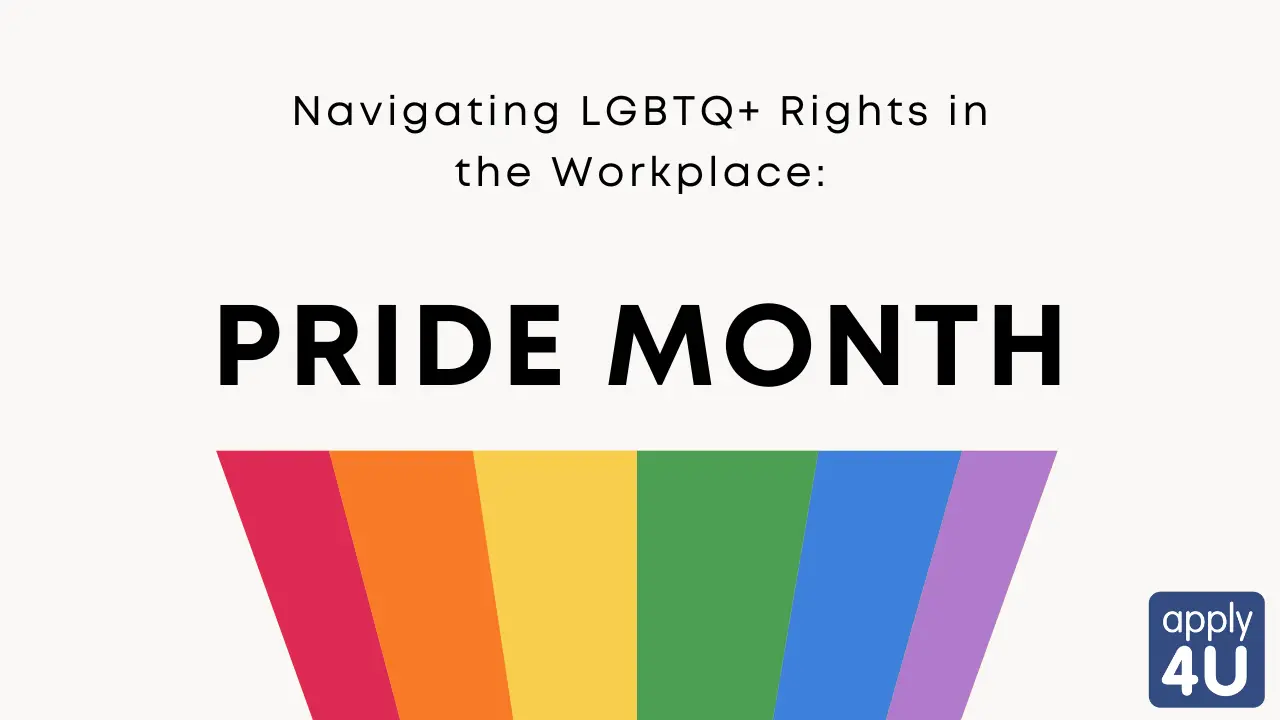Blogs Detail

Navigating LGBTQ+ Rights in the Workplace
Posted by: | Jun 22, 2023

Happy Pride Month! We hope you’re celebrating this time as vivaciously as the Kings and Queens you were born as. In the UK, LGBTQ+ rights in the workplace are protected by legislation aimed at promoting equality and preventing discrimination. In this blog, we’ll provide valuable insights into the legal landscape surrounding LGBTQ+ rights in the UK workplace. By understanding these legal protections, both employees and employers can navigate the rights and responsibilities that contribute to a more inclusive work environment.
The Equality Act 2010:
Now let's sashay down the legal runway and take a closer look at the fabulous Equality Act 2010, the UK's primary legislation that ensures everyone is treated with respect, regardless of their sexual orientation or gender identity.
With this Act in place, LGBTQ+ individuals can confidently strut into the workplace knowing that their sexual orientation or gender identity won't be a barrier to success.
But wait, there's more! The Equality Act doesn't stop at just protection; it adds some extra sparkle for our transgender friends. Gender reassignment is also safeguarded by this fabulous legislation. So, whether someone is embracing their true gender identity or undergoing a fabulous transformation, the Act ensures they're treated with the respect they deserve.
The Equality Act 2010 provides robust protection for LGBTQ+ employees against direct and indirect discrimination, harassment, and victimisation. Employers must ensure that LGBTQ+ individuals are treated fairly and equally throughout all stages of employment, from recruitment to termination.
Gender Identity and Expression:
The Gender Recognition Act 2004 allows individuals in the UK to apply for legal recognition of their acquired gender. This legislation protects the rights of transgender individuals and ensures that they are not subjected to discrimination or harassment due to their gender identity or expression. Employers have a legal duty to support employees who are undergoing gender transition and must provide a safe and inclusive environment for them.
Protected by the European Convention on Human Rights:
The ECHR brings together countries from across Europe, like a fierce drag ensemble, to affirm the fundamental rights and freedoms of all individuals. It's like a high-fashion party where everyone is welcome, no matter their sexual orientation or gender identity.
The ECHR recognizes and respects an individual's private and family life. This means that our LGBTQ+ community can bring their true selves to work without fear or shame. And to our LGBTQ+ friends, remember that the ECHR is your international ally. If you face discrimination or rights violations in the workplace, don't be afraid to raise your voice and seek justice.
Promoting LGBTQ+ Inclusion:
While legal protections lay the foundation for LGBTQ+ rights in the workplace, it is equally important for employers to actively promote inclusion and diversity. By fostering an inclusive culture, employers can create an environment where LGBTQ+ employees feel supported, respected, and valued. This can be achieved through diversity training programs, establishing LGBTQ+ employee resource groups, and implementing inclusive policies and practices.
Implementing inclusive policies and practices is like adding sequins to our already fabulous ensemble. It's about updating employee handbooks to include LGBTQ+ protections, ensuring that health insurance covers gender-affirming procedures, and providing gender-neutral restroom options. It's the little touches that make a big impact, creating an environment where LGBTQ+ employees feel respected and valued.
Remember, embracing LGBTQ+ inclusion isn't just a one-time event; it's an ongoing journey. It's about celebrating Pride Month with colourful decorations and events, but also showing continuous support and recognition throughout the year. Let's keep the spirit of pride alive all year round, reminding our LGBTQ+ employees that they are seen, heard, and loved.
Reporting and Seeking Redress:
If an employee believes they have experienced discrimination or harassment based on their sexual orientation or gender identity, they have the right to seek redress. This can involve reporting the incident internally, following the employer's grievance procedures, or seeking advice from relevant authorities, such as the Advisory, Conciliation, and Arbitration Service (ACAS) or the Equality and Human Rights Commission (EHRC).
Conclusion:
Understanding the legal protections for LGBTQ+ individuals in the UK workplace is essential for fostering an inclusive and discrimination-free environment. Employers must uphold their legal obligations, promote LGBTQ+ inclusion, and create a supportive atmosphere for all employees. By embracing diversity and respecting the rights of LGBTQ+ individuals, workplaces can thrive as inclusive environments where everyone can contribute their best.
Powered by Froala Editor
Want to Know More? Contact Us or Explore our Pricing Plans
Search Post
Tags:
Popular Posts
Recent Posts
Categories
- Accountancy
- Administration
- Advertising
- Aerospace
- Agriculture
- Automotive
- Banking
- Catering
- Charity
- Construction
- Consulting
- Customer Services
- Design , Creative & Arts
- Education
- Energy Oil Gas
- Engineering
- Finance
- Health & Safety
- Healthcare
- Hospitality
- HR
- Insurance
- IT
- Legal
- Logistics
- Manufacturing
- Marketing
- Media
- Multilingual
- Pharmaceutical
- PR
- Procurement
- Property
- Public Sector
- Recruitment Consultancy
- Retail
- Sales
- Scientific
- Senior Management
- Social Care
- Sports & Leisure
- Telecommunications
- Transport
- Travel
- Warehouse
Tags
Tags:
